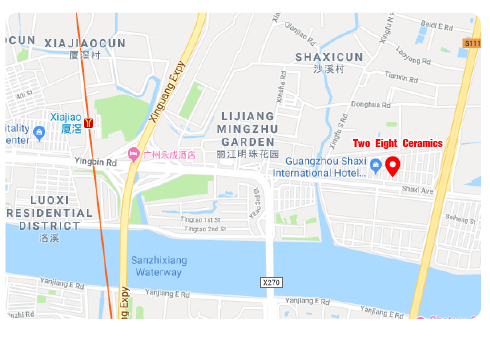Ceramic tableware has been continuously suppressed by the EU. The road to export is difficult.
Despite the opposition of more than half of the EU member states, the European Commission recently announced that it will impose temporary tariffs on ceramic tableware and kitchen utensils imported from China. Experts analyzed that the EU once again attacked Chinese ceramic tableware, which was based on the protection of the interests of domestic enterprises in a crisis environment and suppressed China's competitiveness. Chinese ceramic enterprises should take this opportunity to reflect on their own shortcomings and get out of the development path of regulating competition, coordinating exports and expanding domestic demand.
Chinese ceramic tableware is frequently blocked
According to sources, the European Commission plans to impose a tariff of 17.6%-58.8% on Chinese ceramic tableware and kitchenware manufacturers. According to the plan, the vote on the official collection of Chinese ceramic import tariffs will be held on May 15 next year. The final result is valid for up to 5 years.
The EU industry has different views on this initiative. According to the European Ceramics Industry Association, China’s share of the European tableware and kitchenware market in 2011 increased from 22% in 2004 to 67%. In the past five years, the output of EU tableware and kitchenware manufacturers has lost 650 million euros and laid off 10,000 people, accounting for about 30% of the entire department. Foreign trade associations representing European retailers and importers said that the imposition of tariffs would lead to the closure of some trading companies that import Chinese ceramics, affecting consumers' choice of goods and placing a huge burden on stores.
Chinese ceramic products have become the type of export products with a high frequency of investigation. Frequent anti-dumping investigations have had a huge impact on China's ceramic products exports. Since the EU introduced the temporary anti-dumping duty in March last year, the export volume of Foshan ceramic products, which accounted for more than 75% of the national export volume, fell by more than 50% year-on-year.
Suppressing China's competitiveness under the crisis
China is the largest producer of daily-use ceramics, accounting for about 70% of the world's production. Since the ceramic industry is a labor-intensive industry, and the EU enterprises lack the labor cost advantage, China's daily-use ceramics market share is now close to 50%, making it the largest importer of European-style ceramics for daily use.
The EU has frequently initiated anti-dumping measures against Chinese ceramic tableware, both because of the EU itself and the reasons for the unreasonable development of China's ceramic industry. Huo Jianguo, president of the International Trade and Economic Cooperation Research Institute of the Ministry of Commerce, told this newspaper that ceramic products are China's most competitive export strengths. The ceramic production within the EU is very limited. The ceramics are levied on the grounds of protecting domestic industries and maintaining employment. Temporary tariffs are deliberate acts of suppression that weaken China’s export competitiveness.
Secondly, there is a certain degree of excessive competition in China's ceramic industry, and it is necessary to coordinate the export order. Jin Bosong, a researcher at the Institute of International Trade and Economic Cooperation of the Ministry of Commerce, holds the same view. In the context of the general economic downturn in European countries, China’s exports have put a lot of pressure on EU companies. In response to the EU's trade protection measures, we have expressed opposition to both positions and we must also consider how to optimize the scale and structure of exports. Jin Bosong said in an interview with this newspaper.
Ding Dou, an associate professor in the Department of International Political Economics at the School of International Studies at Peking University, believes that this issue needs to be viewed rationally from the international trade landscape. The EU is China's largest trading partner. The EU as a whole has long been in a trade deficit with China, and more than 70% of the trade deficit comes from China. The long-term trade deficit is a potential cause of trade friction. Ding Dou told this newspaper that China is still a non-market economy country in the eyes of the EU, which makes it easier for the EU to launch anti-dumping measures against China.
Guangdong Hosen Two Eight Industrial Co.,Ltd is different from other companies as we provide timely and unique services to our respected clients.
If you would like to solve your Porcelain Dish Set problem by adopting a . Guangdong Hosen Two Eight Industrial Co.,Ltd, an experienced and professional peovider having won high reputation globally will be your bast choice. You won't be disappointed
It is never too late to have a new mindset and to get things moving in the right direction. Choose Guangdong Hosen Two Eight Industrial Co.,Ltd to be your quality provider.
We studied how market-leading companies are harnessing data to reshapeGuangdong Hosen Two Eight Industrial Co.,Ltd, and explored how they can put data to work for us in ways that create value for our own businesses.
Guangdong Hosen Two Eight Industrial Co.,Ltd. is a professional ceramic tableware manufacturer. It is committed to provide customers with one-stop purchasing service for hotel supplies and catering suppliers about 20 years by now. Sitemap
CONTACT US
Mobile: +86-18127955755 / 13694279549
E-mail: haoxin-2@28ceramics.com /
Office Address: 3/F-4/F, Shaxi International Hotel Supplies City, Shaxi Village, Guangzhou City, China
Factory Address: Ditou lndustrial Zone, Fengxi District, Chaozhou City, China

